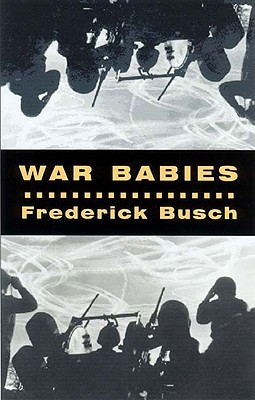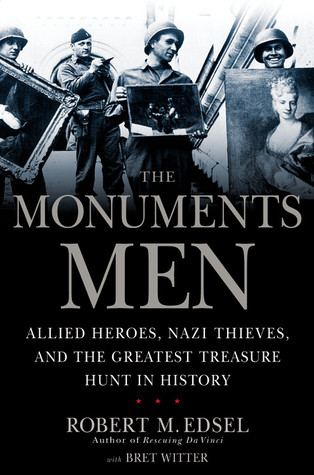 Welcome to the last week of the 2014 War Through the Generations With a Twist Read-a-Long of War Babies by Frederick Busch for June.
Welcome to the last week of the 2014 War Through the Generations With a Twist Read-a-Long of War Babies by Frederick Busch for June.
A short but powerful tale weaving together moral complexity and romantic intrigue, Frederick Busch’s War Babies is the story of an American lawyer in his mid-thirties (Peter Santore) who travels to England in an attempt to tie up the loose ends of his own dark past. Peter’s father, a prisoner who turned traitor in a Korean War POW camp, might have had something to do with a fellow captive’s death, the father of one Hilary Pennels — now a woman Peter’s age who lives in Salisbury. When Peter and Hilary meet, they both want information from the other, and more, and find themselves engaged in a wary dance of attraction laced with mistrust. But it may be a third person, the sole remaining survivor of the camp — a Mr. Fox — who holds the key to the mystery of betrayal that haunts Peter and Hilary alike. (publisher’s summary)
Because the novel is so short, we’re only hosting 2 discussions for it. For week one’s discussion, go here.
For this week’s discussion, we’ve read pages 51 through the end of the novel.
Serena: At one point, Hilary tells Peter that Fox likes to talk about the war and that he’s brutal about it. Given that war is brutal in itself, did you find anything else brutal about the way he talked about the war?
Anna: Maybe I’ve read too many war novels, but I found the way Fox talked about the war to be the way an old soldier with bitterness talks about the war. It was brutal, but that was to be expected, I think, when one talks about the war.
Serena: I agree; I didn’t find anything unusual about the way Fox talked about the war because he’s clearly bitter — and understandably so. I think maybe she finds it brutal because of her relationship with him, which I found very twisted. He’s supposed to come back and look after her for her father, but then he’s having a sexual relationship with her that gets twisted up in some kind of revenge scenario he’s cooked up to get back at Peter’s father and even Peter himself.
Anna: I thought this book was many shades of messed up, but I was more disturbed by Fox attacking Peter in the duty free store. He had some weird fascination for Peter’s father that went far beyond hatred for his role in Hilary’s father’s death. I understood the characters in that they were in pain, each feeling some deep loss, but they were portrayed so oddly.
I didn’t like the characters or their stories. I didn’t connect with them at all, and I didn’t care how they fared in the end. The only thing I like about this book was how it shows the scars of war among those who fought and those who didn’t, those who survived and those who were abandoned.
Serena: I have to agree with you; this was a book with a great deal of potential, but it was poorly executed. I think the most interesting character was Fox, but you don’t really get to know him.
I wonder if the third-person POV had something to do with the narration disconnecting us from the characters?
There’s another part in which Hilary talks about the nation of cripples and how we have a duty to recover from the past and the move forward, what do you think she meant by that? A duty to whom? And is she even taking her own advice?
Anna: I was confused by how it was mostly first-person but switched to third person at times and even used second person at one point.
Fox was interesting and creepy. Mostly creepy, though. But it was hard to like because the characters were all over the place. I’m not sure we even really got to know them. Peter’s short trip to England barely scratched the surface. And honestly, I’m surprised he found out as much of the story of their fathers as he did, given that they seemed to spend the entire book in bed.
Honestly, I don’t remember that part about the “nation of cripples,” but I don’t think she’s following her own advice. She seemed to be at first, falling in love or at least in lust with the son of the man who may or may not have killed her father, but that whole scene with her mocking Peter makes me think twice about that.
Do you think Hilary and Peter were in love? What was all that about if it wasn’t love? It seemed so melodramatic and so impossible.
Serena: I don’t think she follows her own advice either, but I think she’s manipulative — case in point, her mocking of Peter, and her jabs at him even before that.
I think Peter was trying to be in love, seeing that there might be something else out there for him beyond thinking about his father’s betrayal. I wonder how manipulative Hilary and Fox were from the very beginning since they seem to be in on some kind of torture scheme where Peter is concerned. Did Fox know that Peter was coming beforehand because of who Peter asked about Hilary’s father? Did she agree to be in on it?
I don’t think she’s in love or even knows how to be in love honestly. It is overly dramatic and ridiculous. And at one point I was thinking that maybe it was that way on purpose to demonstrate how traumatized people can have such heightened emotions and be out of control.
Anna: I agree that she was manipulative, and I actually did feel bad for Peter after he caught her with Fox because he thought they had something in common. I do wonder how much she knew, since I’m still not convinced their meeting up was a coincidence.
I think ridiculous is a good way to describe this story. The characterizations and their relationship were just over the top.
What did you think about Hilary’s anger at her father for not leaving the cave and how it meant that he chose to abandon her? The way she called her father “the hero” throughout the book was really put into perspective after that. We read so many stories of children being proud of their hero fathers, and she really turns that on its head.
Serena: I’m not convinced their meeting was a coincidence either.
I do find it interesting that Peter wants to believe there was some good in his father — and its almost like he would have preferred his father had not come home to be put in jail but remained out there somewhere — and Hilary sees nothing good about her father’s actions.
I think they are both feeling abandoned and maybe for a brief moment they find solace with one another, but that is short-lived.
There’s a point in the latter part that Hilary really turns her own notions about her father upside down — it’s like she’s questioning her own convictions about the matter. It’s after Peter asks why they don’t hate each other, and she says something to the effect of they chose how they wanted to live and die, and “you mean they owe us from the grave?” It’s like she’s trying to convince him that they can choose to not hate each other, but she doesn’t even believe it herself.
Anna: That is probably the most clever thing about the novel, that Peter’s father was a traitor and he wanted to believe he was good, and Hilary’s father saved many of his men and she thought he was anything but a hero. I wonder how much Fox and his weird hold over her affected her feelings about her father?
Serena: I wonder that too, but doesn’t look like we’ll ever find out.
What do you think? Feel free to respond to our discussion and/or post any questions you might have in the comments.
Come back in August for our read-a-long of Stella Bain by Anita Shreve.






